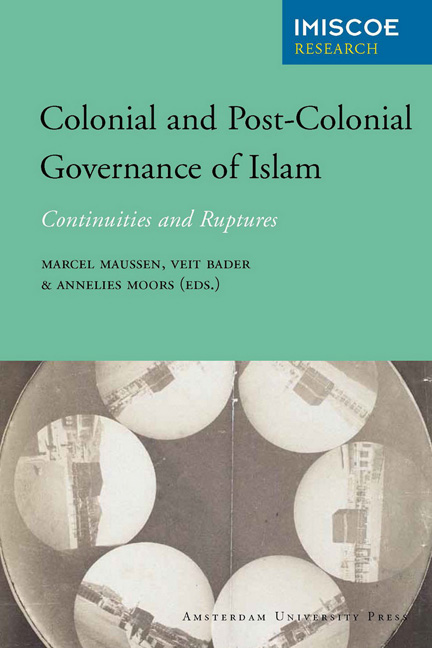2 - Governance of Islam in Colonial Mozambique
Published online by Cambridge University Press: 05 February 2021
Summary
Introduction
Adopting Bader's (2007) approach, this paper analyses governance of Islam in colonial Mozambique from both external and internal perspectives. The external governance perspective focuses on the ideological underpinnings, administrative policies and legal regulations of the Portuguese colonial government that impacted the Islamic religion and the Muslim population, as well as the responses they generated. Three points should be addressed from the start with respect to the Portuguese colonial governance of Islam. First, despite the fact that Portugal's presence in Africa lasted for almost 400 years, the paper concentrates on the period between c. 1900 and 1974. It was only in the twentieth century that a modern colonial regime was established, and for the first time Portugal actually ‘encountered’ Mozambican Muslims face-to-face as such and transformed them into colonial subjects. From their initial confrontations with Muslims in the sixteenth century up until 1900, the Portuguese pursued no concerted effort in that sense. Even Catholic evangelisation was not as widespread and invasive as would be expected from a state that had close-knit ties to the Church and upheld an official cross and sword slogan based on the ideals of the Crusades and the Reconquista. On the one hand, this was due to the fact that the presence and impact of Catholic religious agents up until the twentieth century was limited, while their relationship with local Portuguese administrators was often strained to the extent that some were purged from Mozambique territories in the mid-eighteenth century (Andrade 1955). On the other hand, survival strategies and trade necessities forced the Portuguese to adopt more accommodationist attitudes towards Muslim Africans, with whom interaction was regulated through a nominal recognition of the European suzerainty by some, who either paid or did not pay a symbolic tribute, or more often than not, received a pension from the Portuguese Crown. When these relations were unfriendly, the Portuguese built fortresses to protect themselves. When they were relatively good, they built small feitorias (Portuguese outposts or warehouses) and sent trading vessels or caravans to them on a regular basis (Andrade 1955: 54-55)· The history of these relations, starting with Vasco da Gama's arrival in 1498 and continuing until the beginning of the twentieth century, is extensively documented in the archives of Portugal, Goa and Mozambique in a voluminous correspondence written in old Swahili-Arabic script (the lingua franca of the region).
- Type
- Chapter
- Information
- Colonial and Post-Colonial Governance of IslamContinuities and Ruptures, pp. 29 - 48Publisher: Amsterdam University PressPrint publication year: 2012
- 3
- Cited by

